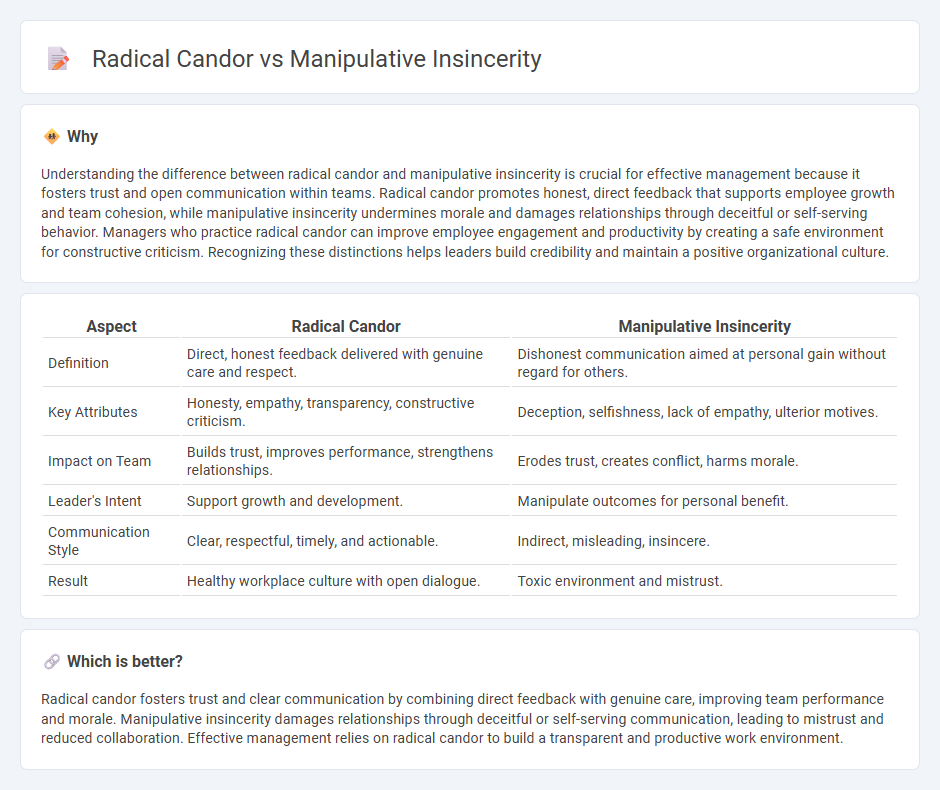
Radical candor fosters open communication by combining direct honesty with genuine care, promoting trust and collaboration in management. Manipulative insincerity undermines team morale by masking true intentions, leading to confusion and resentment. Discover how mastering radical candor can transform your leadership style and enhance workplace dynamics.
Why it is important
Understanding the difference between radical candor and manipulative insincerity is crucial for effective management because it fosters trust and open communication within teams. Radical candor promotes honest, direct feedback that supports employee growth and team cohesion, while manipulative insincerity undermines morale and damages relationships through deceitful or self-serving behavior. Managers who practice radical candor can improve employee engagement and productivity by creating a safe environment for constructive criticism. Recognizing these distinctions helps leaders build credibility and maintain a positive organizational culture.
Comparison Table
| Aspect | Radical Candor | Manipulative Insincerity |
|---|---|---|
| Definition | Direct, honest feedback delivered with genuine care and respect. | Dishonest communication aimed at personal gain without regard for others. |
| Key Attributes | Honesty, empathy, transparency, constructive criticism. | Deception, selfishness, lack of empathy, ulterior motives. |
| Impact on Team | Builds trust, improves performance, strengthens relationships. | Erodes trust, creates conflict, harms morale. |
| Leader's Intent | Support growth and development. | Manipulate outcomes for personal benefit. |
| Communication Style | Clear, respectful, timely, and actionable. | Indirect, misleading, insincere. |
| Result | Healthy workplace culture with open dialogue. | Toxic environment and mistrust. |
Which is better?
Radical candor fosters trust and clear communication by combining direct feedback with genuine care, improving team performance and morale. Manipulative insincerity damages relationships through deceitful or self-serving communication, leading to mistrust and reduced collaboration. Effective management relies on radical candor to build a transparent and productive work environment.
Connection
Radical candor and manipulative insincerity both involve interactions where honesty plays a central role, but they differ fundamentally in intent and impact on team dynamics. Radical candor fosters trust and growth through direct, empathetic communication, while manipulative insincerity undermines relationships by blending false praise or criticism with an agenda to deceive or control. Understanding this connection helps managers cultivate authentic transparency, avoiding harmful behaviors that erode morale and productivity.
Key Terms
Feedback
Manipulative insincerity involves giving dishonest or insincere feedback to avoid conflict or gain personal advantage, often damaging trust and team morale. Radical Candor encourages clear, honest, and compassionate feedback that challenges directly while showing care for the individual, promoting growth and collaboration. Explore more about how adopting Radical Candor can transform your feedback culture.
Trust
Manipulative insincerity erodes trust by combining dishonest praise with hidden criticism, creating confusion and mistrust in professional relationships. Radical candor builds trust through honest, clear, and empathetic communication that challenges directly while caring personally. Explore how cultivating radical candor can transform workplace dynamics and enhance trust.
Communication
Manipulative insincerity involves insincere communication designed to deceive or avoid conflict, often leading to mistrust and poor workplace relationships. Radical candor emphasizes honest, direct communication paired with genuine care for others, fostering transparency and stronger collaboration. Explore how adopting radical candor can transform your communication dynamics and improve team effectiveness.
Source and External Links
Manipulative Insincerity - What Is It & How It Impacts Organizations? - This article discusses manipulative insincerity as behavior that lacks honesty and kindness, often with insincere intentions to achieve personal goals, and highlights its impact on organizations.
Manipulative Insincerity - What Is It & How It Impacts Organizations? - The article delves into manipulative insincerity within organizational dynamics, where individuals prioritize appearances over honesty, and explores its effects on workplace relationships and productivity.
Radical Candor - The Manager's Handbook - This resource touches on manipulative insincerity as a form of feedback that fails to reflect genuine thoughts, often used to gain personal advantages, aligning with the principles of Radical Candor.
 dowidth.com
dowidth.com